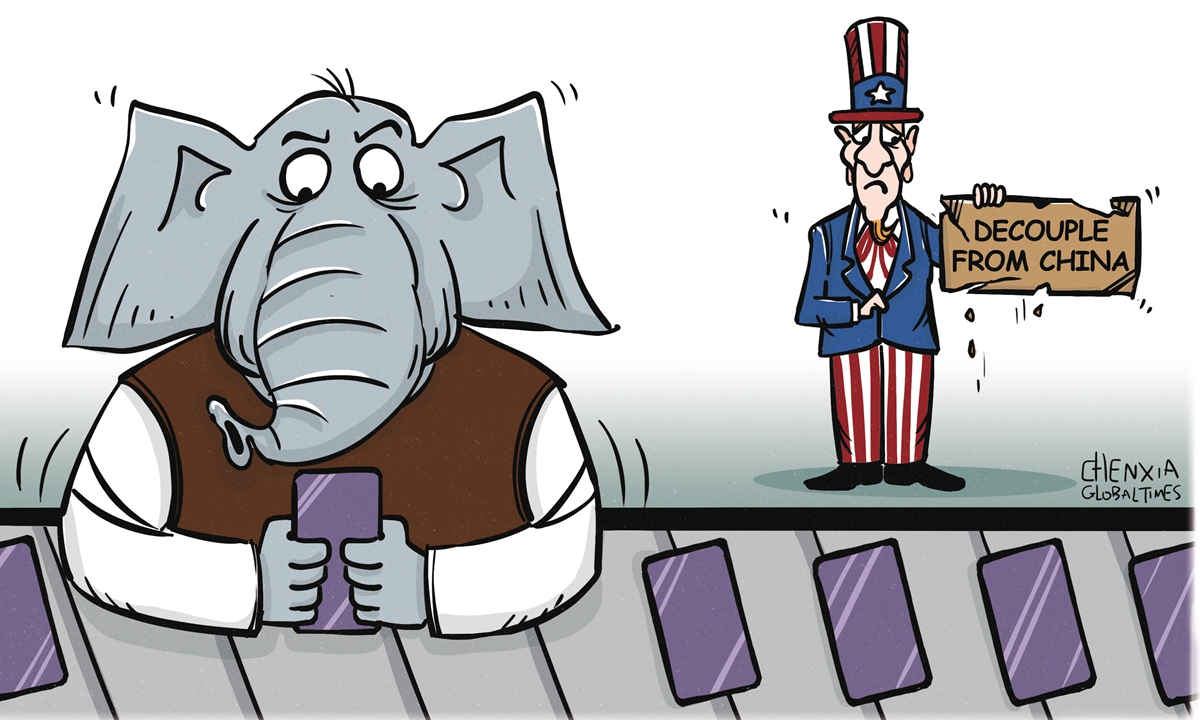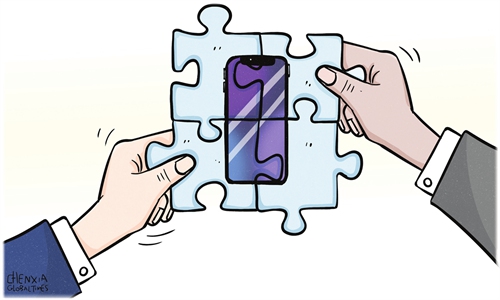Iphone transfer to India a test of US ‘decoupling’

Illustration: Chen Xia/GT
Apple Inc. announced it will start producing the iPhone 14 in India on Monday. This is widely seen by analysts as an important step for India to catch up with China and become the world's "second-largest factory."
Whether Apple's move to India is a forced "political decision" or a forward-looking "economic decision," there is no doubt that it comes against the backdrop of Washington's shift to a containment-based strategy toward China.
On the surface, this may seem bad for China, but in the long run, it is a good thing for the country. It is not so much a test of smartphones made in China as it is a test of the US' "decoupling" policy.
The result is likely to push Chinese smartphone manufacturing on the two tracks to accelerate forward - toward high-end and expansion of the world market, so that the US will eventually pay a heavy price for its "decoupling" policy.
Apple's transfer will not necessarily be successful, but failure is also possible. In 2013, when I first came to work in Brazil, I heard that Foxconn was going to invest billions of dollars in the state of São Paulo to build a manufacturing center, creating 100,000 jobs. Three years later, when I left Brazil, the factory was on the verge of closing down. Now, they say another Brazil factory can assemble 6.1-inch iPhone 13.
Apple is rich and powerful, so it can have a try in India, Brazil, or everywhere else in the world, but one thing is for sure, it can't find another China. Apple will consume the energy of its development gradually in attempting such a transfer.
Apple's move to India may be successful, but the process must not be smooth, as it depends on how India can adjust its labor policies, and whether India can improve its labor ability in a short period of time, and keep up with basic facilities, infrastructure as well as services. To this extent, Apple is also exploring the road for other foreign investors, including Chinese manufacturers.
If Apple's presence is to survive and grow, it must be based on India's improved policies and legal system, which will be beneficial for more foreign companies to enter India in the future.
Apple has moved to India for assembly, but the vast majority of components for its iPhone and iPad, among other products, are made outside India, including in China. Chinese suppliers already account for more than 25 percent of the value of an iPhone. What's more, Chinese suppliers are in an upward trend in the iPhone production chain.
The development of Chinese smartphones and its supporting enterprises will enlarge the linkage between Chinese and Indian manufacturing industries, form multiple industrial links, and ultimately promote the improvement of China-India relations.
Of course, the most important thing is the iPhone market. In terms of the current smartphone market in India, China's Xiaomi and South Korea's Samsung dominate. Both phones are technically capable of meeting the needs of the vast majority of consumers in India, and they have price advantages.
Apple can sell only a small amount to high-end Indian consumers, but when production goes up, Apple will supply the markets of other countries too. Then, Apple will face a challenge of whether its overseas customers can trust an iPhone assembled in India.
The situation in China is significantly different. China is one of the biggest markets for iPhones. In 2021, Apple sold 57.87 million units in China with sales reaching 378.5 billion yuan ($53 billion). China has become Apple's most profitable market in the world.
In the case of the US increasing its high-tech blockade of China, Chinese consumers will certainly not be as loyal "Apple fans" as they were in the past.
China has world's leading smartphone manufacturing capabilities, and as the technological power of supporting manufacturers rises, Chinese consumers do not have to choose iPhones.
If the market reverses, then Apple's industry chain and market will be impacted, and Apple manufacturing in India will be affected. US and Apple policymakers, Indian producers, as well as the entire world's Apple production and supply chain, may all bear the backlash of Washington's containment policy toward China.
Washington is hell-bent to split the world into two Apple markets, and then Apple, the most profitable company in the country, will be at the end of its rope. The future may be how China's branded phones expand their markets and manufacturing chains, both domestically and globally.
The author is a senior editor with People's Daily, and currently a senior fellow with the Chongyang Institute for Financial Studies at Renmin University of China. dinggang@globaltimes.com.cn. Follow him on Twitter @dinggangchina


